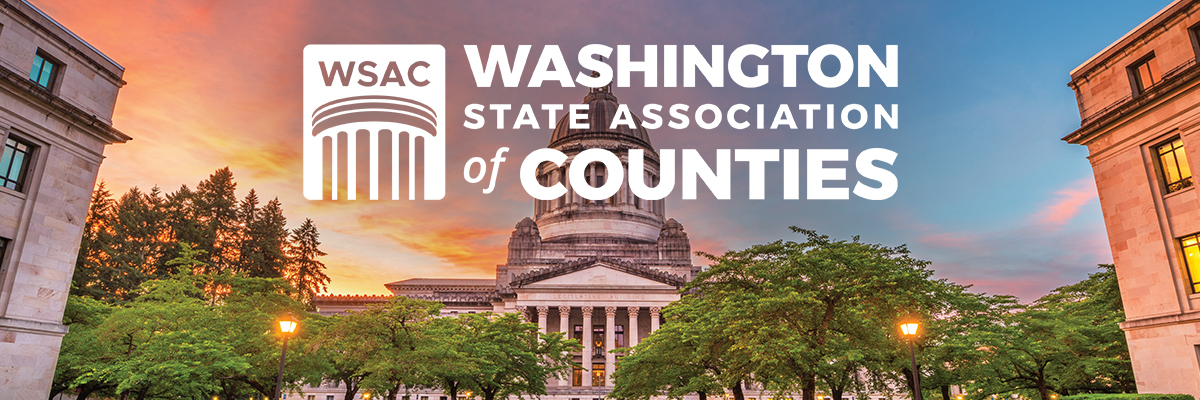The Washington State Association of Counties (WSAC) is a vital organization that fosters collaboration, provides training, and advocates for the interests of counties in Washington State. Unsurprisingly, even people who have heard of WSAC may be confused about what the association does because we do so many things! This is why we wanted to take the time to help explain the roles and functions of WSAC, highlight its affiliate associations, and how it facilitates cross-functional teams and enhances representation by bringing together counties and stakeholders from across the state.
Who is WSAC?
The Washington State Association of Counties, established in 1906, is a non-profit organization that represents all 39 counties in the state. As a unified voice for county governments, WSAC strives to strengthen local governance, promote efficient administration, and address shared challenges. Its primary goals are to support and advocate for counties by coordinating legislative activities and providing various resources such as in-person and on-demand training, interactive data tools, technical assistance, and a county job board. WSAC’s highly-dedicated, 15 member staff is comprised of experts in the issues that our counties face, the development and deployment of education and training, and data collection and analysis. Consider them an extension of your county team and a go-to for resources and knowledge!
We believe that counties, as the closest government to the people, should be a primary stakeholder at the decision-making table and strive to do everything we can to help our county commissioners and councilmembers do their best with the tools they have. We do this by helping to create cohesive legislative priorities, building a uniform policy agenda, and helping to bring the over 140 county commissioners together to make the needs of counties known in a single unified voice.
What do we do?
Training:
WSAC prides itself on being able to produce high-quality training for county elected officials and staff and citizens interested in local government. The County Development Institute of Washington (CDIWA) is our premiere online/on-demand resource for elected officials to receive their Certified Public Official (CPO) training, and also has non-credited courses on Water and Timber education, with other courses in the works, such as public health. In-person, there are a multitude of conferences covering similar curricula, but also give attendees the opportunity for Q&A, networking, and receiving the most up-to-date information on given issue areas from the foremost experts in the field. A few of our major conferences include Newly Elected Officials (NEO) for all new incoming county electeds, the County Leaders Conference, where nearly 400 county leaders and other attendees gather once per year, and Courthouse Briefings, where WSAC takes to the road to visit nearly all 39 counties each year in order to stay connected with our members.
WSAC Affiliates and Partners:
WSAC aids in the administration of various affiliated organizations that specialize in specific areas of county governance and policy. These affiliates include the Washington State Association of County Engineers (WSACE), the Washington State Association of Local Public Health Officials (WSALPHO), the Washington Association of County Solid Waste Managers, and others. WSAC also works closely with the Washington Association of County Officials (WACO), a sister organization that includes elected county assessors, auditors, clerks, coroners and medical examiners, prosecuting attorneys, sheriffs, treasurers, and comparable appointed officials in charter counties. By working closely with these affiliated entities, WSAC ensures comprehensive representation and targeted support for counties.
Sphere of Influence:
The association’s influence extends across a broad spectrum of issues relevant to county governance. This includes matters such as public safety, transportation, land use planning, human services, economic development, and many others. WSAC actively engages with state and federal government agencies, legislators, and stakeholders to shape policies that address the unique needs of counties in Washington state.
Fostering Collaboration:
One of WSAC’s significant contributions is its ability to bring together counties and stakeholders, fostering collaboration and the formation of cross-functional teams. Through conferences, workshops, and training programs, WSAC provides platforms for county officials, administrators, and staff to exchange knowledge, best practices, and innovative ideas.
Proactive and Responsive to County Challenges:
WSAC’s collaborative efforts have led to the establishment of cross-functional teams that address specific challenges faced by counties. For example, teams may be formed to tackle issues related to timber management, environmental sustainability, or intergovernmental relations. By fostering collaboration among counties, WSAC enables the sharing of resources, expertise, and solutions that benefit all.
WSAC serves as a strong advocate for counties at the state and federal levels. The association actively lobbies for policies that promote the interests of counties, advocating for legislative measures that ensure fair funding, enhanced services, and improved governance structures.
Advocacy:
Advocacy efforts have helped build better representation for counties, ensuring that their concerns and perspectives are heard by policymakers. By actively engaging with elected officials, agencies, and other stakeholders, WSAC provides a unified voice for counties and contributes to the development of policies that reflect the diverse needs of Washington State’s counties.
Get Involved:
Getting involved in local government is not easy, but WSAC is here to help. Whether you’re already elected or have questions about how to run for office, we can get you to the right spot. If you’re already elected and want to learn how you can join the various state and federal boards and commissions, or maybe you’d like to become a more invested member of WSAC by joining our various committees, like the Legislative Steering Committee, reach out, and we’ll get you the information you need to be successful.


